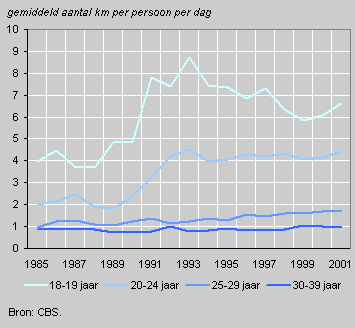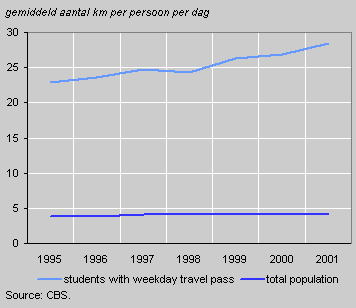Students travel more on student travel pass

Students with a student travel pass for weekdays travelled an average 28 kilometres a day by public transport in 2001. An average person living in the Netherlands only covered four kilometres a day by public transport. The distance travelled by students with a travel pass has risen by a quarter since 1995.
Seven times as many public transport kilometres
In 2001 students with a weekday travel pass travelled an average fifty kilometres a day, regardless of form of transport. This is eighteen more than the average for the population. They travelled just over 28 of these kilometres by public transport: nineteen by train and just over nine by bus, tram and metro. They therefore travelled seven times as many kilometres by public transport than the average Dutch resident. They do travel considerably fewer kilometres at the wheel of a car, however, but slightly more than average as car passengers
Distance travelled by form of transport, 2001

Introduction of student travel pass
The annual student travel pass was introduced in 1991, boosting the use of trains, buses, trams and metro. In that period the total number of public transport passenger kilometres rose by one third. Students accounted for nearly seventeen percent of this increase. Total distances travelled rose for the age group 18-25 years in particular, which includes most students.
Distances travelled by public transport by age

Weekday or weekend pass
Since November 1994, students have to choose either a travel pass valid on weekdays, or one valid for the weekends. Nine out of ten students opted for the weekday pass.
Distances travelled by public transport by weekday/weekend pass

Fewer journeys, longer distances
Since 1995 the number of journeys by public transport fell by ten percent for students with a weekday pass. But the number of kilometres travelled increased from 23 a day in 1995 to 28 a day in 2001. So their journeys have become longer.
Hermine Molnár